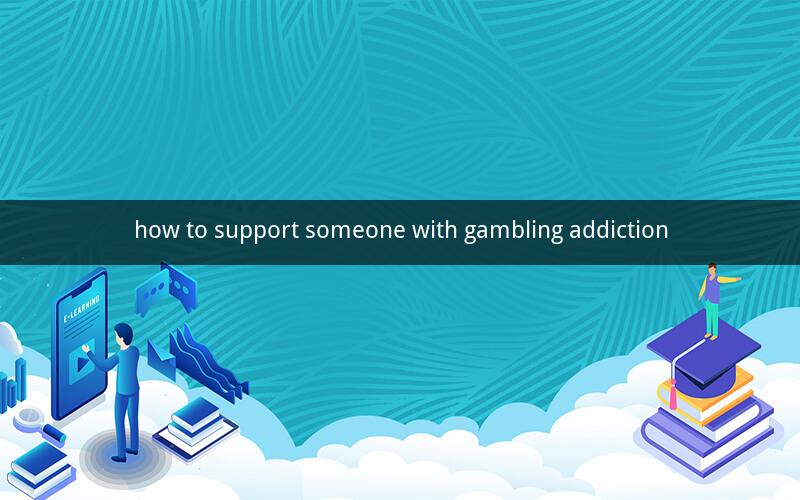
Supporting Someone with Gambling Addiction: A Comprehensive Guide
Table of Contents
1. Understanding Gambling Addiction
2. Identifying Signs of Gambling Addiction
3. The Importance of Education and Awareness
4. Encouraging Professional Help
5. Building a Supportive Environment
6. Communication Strategies
7. Managing Financial Consequences
8. Coping with Relapse
9. The Role of Self-Care
10. Encouraging Positive Changes
1. Understanding Gambling Addiction
Gambling addiction, also known as problem gambling, is a compulsive behavior that leads to significant harm or distress. It is characterized by an inability to control gambling despite negative consequences. To support someone with gambling addiction, it is crucial to have a clear understanding of the condition.
2. Identifying Signs of Gambling Addiction
Recognizing the signs of gambling addiction is the first step in providing support. These signs may include:
- Preoccupation with gambling thoughts
- Needing to gamble more money to achieve the same level of excitement
- Feeling restless or irritable when unable to gamble
- Continually returning to gambling despite negative consequences
- Lying to family and friends about gambling activities
3. The Importance of Education and Awareness
Education and awareness are key components in supporting someone with gambling addiction. Learn about the addiction, its effects on the individual and their loved ones, and the resources available for treatment.
4. Encouraging Professional Help
Professional help is essential for someone struggling with gambling addiction. Encourage your loved one to seek out counseling, therapy, or support groups. Here are some options:
- Cognitive-behavioral therapy (CBT)
- Therapy focused on financial management
- Gamblers Anonymous (GA) meetings
5. Building a Supportive Environment
Creating a supportive environment is crucial for someone with gambling addiction. This may involve:
- Providing a safe and non-judgmental space for open communication
- Encouraging healthy activities and hobbies
- Avoiding enabling behaviors, such as bailing them out of debt
6. Communication Strategies
Effective communication is vital in supporting someone with gambling addiction. Here are some strategies:
- Use "I" statements to express your feelings without blaming the individual
- Listen actively and without judgment
- Acknowledge their struggles and offer empathy
- Set clear boundaries and expectations
7. Managing Financial Consequences
Gambling addiction often leads to significant financial consequences. Help your loved one manage these by:
- Creating a budget to address debts
- Exploring debt consolidation options
- Encouraging financial counseling
8. Coping with Relapse
Relapse is a common challenge in recovery from gambling addiction. To cope with relapse:
- Remain supportive and non-judgmental
- Encourage your loved one to return to therapy or support groups
- Focus on the progress made, rather than the setback
9. The Role of Self-Care
Supporting someone with gambling addiction can be emotionally and physically demanding. Take care of yourself by:
- Seeking support from friends, family, or support groups
- Engaging in activities that promote well-being
- Prioritizing self-care and mental health
10. Encouraging Positive Changes
Encourage your loved one to make positive changes in their life by:
- Setting achievable goals
- Celebrating small victories
- Encouraging the development of new skills and hobbies
FAQs
1. What are the long-term effects of gambling addiction?
- Long-term effects can include financial ruin, relationship problems, mental health issues, and legal troubles.
2. How can I help someone who is hiding their gambling addiction?
- Approach them with empathy and offer to help them find professional support.
3. Is it possible to recover from gambling addiction?
- Yes, recovery is possible with the right support, treatment, and dedication.
4. What role do support groups play in the recovery process?
- Support groups provide a community of individuals facing similar challenges, offering emotional support and practical advice.
5. How can I help my loved one manage their debt?
- Encourage them to seek financial counseling and help them create a realistic plan to address their debts.
6. What should I do if my loved one relapses?
- Remain supportive and encourage them to seek help from their therapist or support group.
7. How can I cope with the stress of supporting someone with gambling addiction?
- Seek support from friends, family, or professionals and prioritize self-care.
8. Can someone with a gambling addiction be a good parent?
- It is possible for someone with a gambling addiction to be a good parent, but they must work on their addiction and seek treatment.
9. What are some signs that someone is ready to seek help for their gambling addiction?
- Signs include expressing a desire to change, acknowledging the negative impact of their gambling, and showing a willingness to seek professional help.
10. How can I help my loved one develop healthier habits?
- Encourage them to engage in hobbies, exercise, and other activities that promote well-being and reduce the urge to gamble.